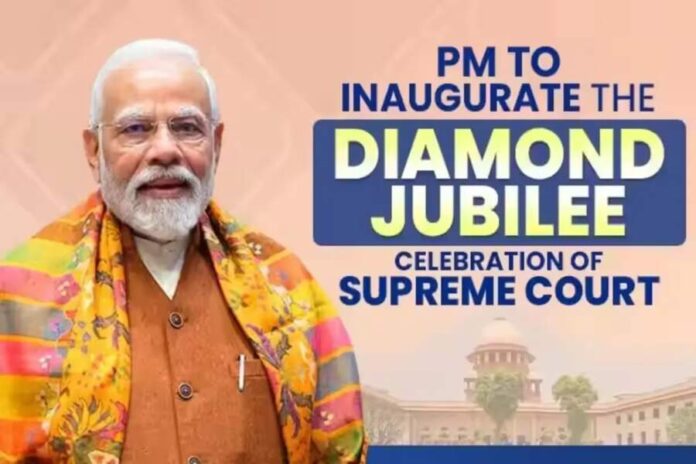The Diamond Jubilee celebrations of the Supreme Court of India mark a monumental moment in the annals of Indian judiciary. It’s not just a celebration of longevity but a testament to the enduring strength and resilience of India’s highest judicial body. Over the past six decades, the Supreme Court has played a pivotal role in shaping the legal landscape of India, delivering landmark judgments that have significantly impacted the socio-economic fabric of the nation.
PM Modi’s Vision for Judicial Reform
Prime Minister Narendra Modi, in his address, underscored the need for comprehensive judicial reforms. His vision encompasses not just the strengthening of legal infrastructure but also embracing technological advancements to make justice more accessible and efficient. Modi’s commitment to reforming the judiciary is a cornerstone in his plan to accelerate India’s development and uphold the rule of law.
The Supreme Court’s Role in India’s Development
From adjudicating on matters of fundamental rights to interpreting complex laws, the Supreme Court has been instrumental in India’s development. Its judgments have not only resolved legal disputes but also laid down precedents that guide future legal interpretations. The Supreme Court stands as a guardian of justice, ensuring that democratic values are upheld and the constitution is protected.
PM Modi’s Address: A Synopsis
In his eloquent address, PM Modi highlighted the significant achievements of the Supreme Court and its indispensable role in Indian democracy. He commended the judiciary for its commitment to upholding justice and praised the court’s adaptability in the face of modern challenges. Modi’s speech was not just a celebration of the court’s past but a blueprint for its future.
Legal Education and the Future
Stressing the importance of legal education, PM Modi emphasized the need to nurture the next generation of legal professionals. He outlined various initiatives aimed at enhancing the quality of legal education in India, reflecting his vision of a robust and enlightened legal system.
Empowering the Common Man through Law
A key focus of Modi’s speech was on making justice accessible to the common man. He spoke about the importance of legal aid and awareness, ensuring that the benefits of the judicial system reach the farthest corners of the country. This commitment to legal empowerment is a significant step towards a more inclusive and equitable society.
PM Modi’s Emphasis on Women’s Rights in Judiciary
PM Modi highlighted the progress made in ensuring women’s rights within the judicial system, both in terms of representation and legal protections. He acknowledged the challenges still faced by women in the legal domain and laid out a path for further empowerment and equality.
Technology Integration in Legal Proceedings
The integration of technology in the judiciary was a key theme in PM Modi’s address. He envisioned a future where digital courts and e-governance are the norms, making the judicial process more efficient and transparent. This technological leap is seen as a critical step in modernizing India’s legal system.
Role of Judiciary in Upholding Constitutional Values
PM Modi emphasized the Supreme Court’s role in balancing rights and duties, and its guardianship of the Constitution. He lauded the court for its commitment to upholding constitutional values and ensuring that the rights of citizens are protected.
PM Modi’s Global Perspective on Justice
Modi’s address also touched upon India’s role in the global judicial landscape. He drew comparisons and sought collaborations with international legal systems, showcasing India’s commitment to upholding global justice standards.
The Supreme Court’s Evolving Jurisprudence
The Prime Minister spoke about the Supreme Court’s evolving jurisprudence, adapting to new-age challenges including cyber law, data protection, and more. He commended the court for its progressive legal thoughts and its readiness to embrace new challenges.
Sustainable Development and Legal Framework
Sustainable development and environmental protection were highlighted by PM Modi as key areas where the legal framework plays a crucial role. He called for a stronger emphasis on ecological justice and the implementation of robust environmental laws.
Celebrating Legal Luminaries and Achievements
PM Modi took the opportunity to recognize the contributions of legal giants and celebrate the achievements of the judiciary. He acknowledged the excellence and dedication of those who have contributed to the strength and integrity of the Indian legal system.
Conclusion and the Way Forward
In conclusion, PM Modi’s address at the Diamond Jubilee celebrations of the Supreme Court of India was not just a commemoration of the past but a vision for the future. It sets the tone for a judiciary that is more accessible, technologically advanced, and aligned with the needs of a modern India.
FAQs
- What is the significance of the Diamond Jubilee celebrations of the Supreme Court of India?
- The Diamond Jubilee marks 60 years of the Supreme Court’s existence and its role in shaping India’s legal landscape.
- How does PM Modi envision the future of judicial reform in India?
- PM Modi envisions a judicial system that is technologically advanced, accessible, and efficient, focusing on comprehensive reforms.
- What role has the Supreme Court played in India’s development?
- The Supreme Court has played a critical role in interpreting laws, protecting fundamental rights, and upholding the constitution, thereby influencing India’s socio-economic development.
- What are some of the key points from PM Modi’s address at the Jubilee celebrations?
- Key points include the need for judicial reform, the importance of legal education, empowerment of the common man, and embracing technology in the judiciary.
- How is technology being integrated into the Indian judicial system?
- Technology integration includes digital courts, e-governance, and online legal services, aiming to make the judicial process more efficient and transparent.
For more information, visit ApzoMedia



































































